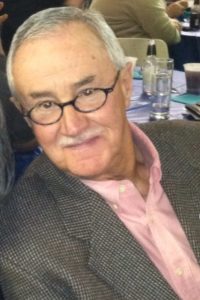It may shock the system of more recent generations, but freedom is not the liberty to do anything one desires. We’ve witnessed that in Baltimore. However, some have reasoned, if one isn’t free to choose wrongly or irresponsibly, one isn’t free. Thus the law of consequences. Without the rule of law, “the pursuit of happiness” may turn ugly. Some distortedly believe torching another’s neighborhood is in the realm of freedom. The notion of freedom came with a corresponding sense of responsibility. Consider a little known 100 year old document titled, “The American’s Creed.” A solemn reminder of not only our freedoms, but our duty.
In 1918, the U.S. House of Representatives conducted a nationwide contest during WW I, soliciting the best summary of American political faith. The creed’s two short paragraphs remind us of the principles that make America great, and the duties we, as citizens, are obligated to preserve those timeless, enduring principles. Maryland resident, William Tyler Page, had returned home from church one Sunday in 1917, when he formulated the idea of fashioning a creed along the lines of the Apostle’s Creed. As a student of history, he composed the creed by drawing upon great American writings such as the Declaration of Independence, Preamble to the Constitution, and Gettysburg Address. His submission captured the contest. Page spent his $1,000 prize money and purchased Liberty Bonds, and donated to his church.
Page’s credo read, “I believe in the United States of America as a government of the people, by the people, for the people, whose just powers are derived from the consent of the governed; a democracy in a Republic, a sovereign Nation of many sovereign States, a perfect Union, one and inseparable, established upon those principles of freedom, equality, justice, and humanity for which American patriots sacrificed their lives and fortunes. I therefore believe it is my duty to my country to love it; support its Constitution; obey its laws; to respect its flag; and defend it against all enemies.” We’ve enjoyed enormous human freedom-but not absolute freedom. At the same time, this freedom was founded upon forms of government, law, culture, and social restraint which has stabilized individual life, and served as ramparts from descending into chaos-so far.
Absent a proper balance of form and freedom, which the Founders considered as political order, consistent with natural law, it will lead to the erosion of individual freedom, or total collapse of social order-anarchy. In Milwaukee last week-end, a black police officer shot a black “armed thug,” who resisted arrest, with a rap sheet longer than his arm. Neighbors contend it wasn’t local blacks who burned down their neighborhood, and targeted police, following a torrent from social media that stoked protesters to “turn out and stir up trouble.” Lawlessness masquerading as protest. Romans 13:3’s timeless admonition, “For rulers are not a terror to good works, but to evil. Do you want to be unafraid of the authority? Do what is good, and you will have praise from the same.”
The battle of ideas prompt some to ask, “Will it be a scholar, philosopher or common man to extricate us from this ditch into which we’ve driven?” Though shrouded in today’s moral relativistic fog, it’s still true that biblical Christianity had a profound impact on our American ethos for over two centuries. It’s imperative that we do more than talk. The Founders were acquainted with the failed republics in ancient Greece and Rome, where the line between majority and mob rule was razor thin. They assiduously studied the lessons of biblical and European history, and fashioned a document resembling the 1215, Magna Carta, that established the principle that even the king was subject to a higher law.
With radical Islamic terrorist breathing ominous threats internationally, few issues vex our nation’s stability and soul today more than chaotic race relations. Tragically, under the first black president, race relations are abysmal, unmatched by his soaring rhetoric to improve those elusive relations, stoked by Obama’s divisive remarks since 2008, driving a wedge between the black community and law enforcement. The Constitutional right to civil protest has again clashed with the “black radicals,“ movement, that Milwaukee County Sheriff David Clarke labeled as a “thinly veiled anarchist movement.” Black “spokesmen” pander to the hundred-fifty year strangle-hold by “Democratic subjugation,” following “race hustlers” like Jesse Jackson, Al Sharpton, and the Black Congressional Caucus, “fanning the flames” of racism from their “anointed bully pulpits.” Democratic liberalism goes after guns-not criminals. Look at Chicago.
Citizens must stand when, and where racism appears, making every effort to oppose racial prejudices and bias, as notable Christian men like Shaftesbury, Wilberforce, and Dr. King, who, on the basis of the biblical view that there are absolutes, demanded we call out evils and injustices as absolutely wrong. Not contrived “social injustices” created by burgeoning government and progressive agendas. Economic misery must be addressed. The most devastating misery is poverty of the soul. Only spiritual renewal will do that.
With caution, we must resist risking co-mingling Christianity with “misguided patriotism,” rejecting the 19th Century notion of “manifest destiny” that fostered the idea our nation could “do anything it chooses,” under the rubric of “God ordained.” Many of our Founding Fathers were Christians, yet they resisted “bending the Scriptures” to fit their noble cause for freedom. We should do no less.
Evangelicals and co-belligerents alike must resist accommodating the “spirit of this age,” couched in progressive liberalism, socialism, and secularism that fosters a further slide of our formerly grand experiment. C.S. Lewis noted, “The very idea of freedom presupposes some objective moral law which overarches rulers and ruled alike. Unless we return to the crude and nursery-like belief in objective values, we perish.” Naysayer and scoffer will dismiss this as inconsequential drivel. Most know otherwise. It’ll require more than quixotic rhetoric. We’re duty bound. Our cloth of freedom may become a ragged edge. What do you think?
Mike Pyatt’s a Natrona County resident. His email’s roderickstj@yahoo.com

